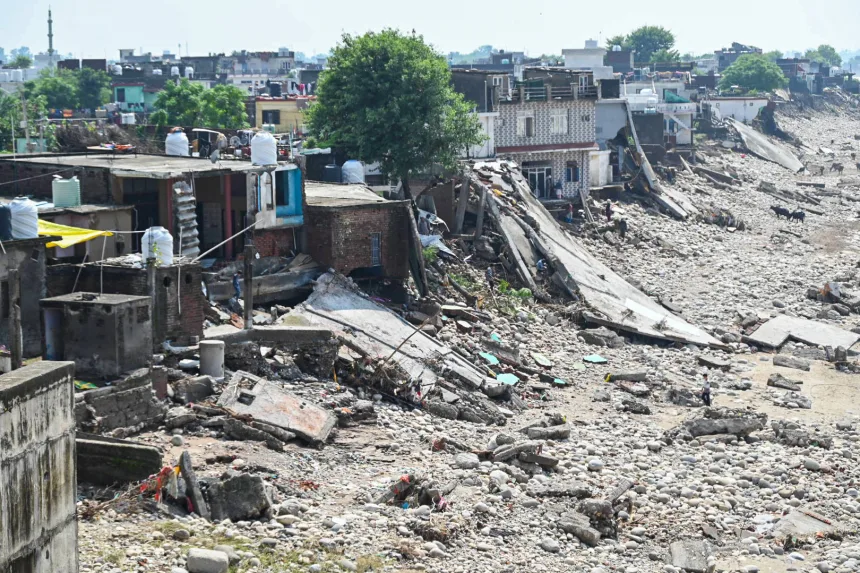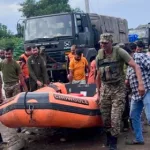Srinagar, Aug 28: After three days of relentless rain, water levels have begun to recede across Jammu and Kashmir, offering some relief to residents and authorities. However, critical road links remain shut, and the aftermath of a cloudburst in Kishtwar has left behind widespread devastation.
Vehicular movement on three major highways, Jammu-Pathankot, Jammu-Srinagar, and Batote-Doda-Kishtwar, remained suspended on Thursday as several stretches were washed away or severely damaged. Officials said restoration work is underway, but the scale of damage may delay reopening.
In Jammu, over 5,000 people were rescued from waterlogged low-lying areas, where floodwaters had risen to waist level. The Army, J&K Police, SDRF, and NDRF deployed boats and personnel across multiple locations for evacuation and relief.
Senior officials from the Irrigation and Flood Control Department said water levels in all major rivers and streams, including the Tawi, have begun to drop steadily following a break in the downpour. In many parts of Jammu city, submerged colonies and markets began to emerge from floodwaters by Thursday morning.
“Improvement in the situation is primarily due to a significant reduction in rainfall over the past 12 hours,” an official said.
Rescue teams continued operations in waterlogged areas, while simultaneously shifting focus toward sanitation and infrastructure restoration. Monitoring of embankments and vulnerable sites remains in place as a precautionary measure.
Meanwhile, a cloudburst in Margi village of Warwan Valley in Kishtwar district late Wednesday night triggered flash floods, causing extensive destruction in the remote region.
Preliminary reports suggest that at least 30 residential houses, a key bridge, and nearly 300 kanals of agricultural land were damaged or washed away, destroying standing crops and displacing dozens of families.
Deputy Commissioner Kishtwar, Pankaj Sharma, told Rising Kashmir that rescue and relief teams from SDRF and local police have reached the affected site. “Thankfully, there have been no casualties so far, but property loss is significant. Temporary shelters have been set up and essential supplies are being arranged,” he said.
However, he acknowledged that restoration of roads, power, and other infrastructure may take time given the tough terrain and ongoing weather uncertainty.
In the Kashmir Valley, the threat of a major flood eased on Thursday with the Jhelum River showing a steady decline in water levels. At Sangam in south Kashmir’s Anantnag district, the river fell below the flood alert mark. In Srinagar, though still close to the danger level, the Jhelum is also receding.
The MeT Department confirmed improved weather conditions with minimal rainfall in the past 12 hours, but warned of more rain in the days ahead.
Dr Mukhtar Ahmad, Director of the Meteorological Department, said brief spells of rain are expected on August 29, mostly in the late afternoon or night. Between August 30 and September 1, light to moderate rain is likely in several areas, with chances of moderate to heavy rain in parts of Jammu division.
“From September 2 to 6, we expect more scattered showers and thundershowers. There’s a risk of landslides, mudslides, and shooting stones during this period, especially in hilly and vulnerable areas,” Dr Ahmad warned.
The department has advised the public to stay away from rivers, embankments, and unsafe structures, particularly during peak rainfall hours.
Despite improving weather, the Jammu–Srinagar National Highway (NH-44) remains closed for the third consecutive day due to landslides and erosion at multiple points, particularly between Jakheni and Chenani.
A traffic police spokesman said, “We advise people not to undertake any journey on the highway until the road is made safe and traffic-worthy.”
Nearly 2,500 vehicles, including trucks carrying fruit and essential goods, have been stranded along the highway, causing logistical bottlenecks and hardships for passengers and transporters alike.
The Batote–Doda–Kishtwar road and Sinthan Top road also remain closed due to landslides and flooding, while the Mughal Road and SSG Road are open but under strict traffic advisories.
Commuters have been urged to maintain lane discipline and avoid overtaking to prevent congestion on vulnerable stretches.






